On today’s episode we travel to the near-future of advertising. Welcome to a future in which you can sign up to be a brand ambassador, and get paid for every time you mention a product in conversation. Simply download the app, and your phone will listen to your every word waiting to hear brand names, and pay you some money every time you mention one.
Guests:
- Deborah Dahl, speech technology expert and principal of Conversational Technologies
- Lee Tien, senior staff attorney at the Electronic Frontier Foundation
- Lindsey Webber, writer, editor and cohost of the podcast Who? Weekly
- Bobby Finger, writer at Jezebel and cohost of the podcast Who? Weekly
- Kristen Strader, campaign coordinator for Public Citizen’s Commerical Alert program
Further Reading:
- An Amazon Echo recorded a family’s conversation, then sent it to a random person in their contacts, report says – The Washington Post
- How closely is Amazon’s Echo listening? – The Washington Post
- Amazon Echo and Google Home Record What You Say. What Happens to Your Data? | WIRED
- 3 gadgets that are always listening and how to stop them
- Amazon is helping to remove false wake words from Alexa’s vocabulary | TechCrunch
- Appliance Science: Alexa, how does Alexa work? The science of the Amazon Echo – CNET
- Know Your Rights When Taking Photos and Making Video and Audio Recordings :: ACLU of Pennsylvania
- The legal limits of recording conduct and conversations | Reporters Committee for Freedom of the Press
- Most Embarrassing Celebrity Sponsored Instagrams | StyleCaster
- Two-Party Consent, The Legal Question At The Center Of The Taylor Swift/Kanye West Feud – Digg
- Instagram’s New Video Feature at Risk of Violating FTC Advertising Rules – Commercial Alert
- Commercial Alert – Protecting communities from commercialism
- CSGO Lotto Owners Settle FTC’s First-Ever Complaint Against Individual Social Media Influencers | Federal Trade Commission
- DJ Khaled faces scrutiny over social media booze posts | CMO Strategy – Ad Age
- RECORDING CONVERSATIONS IN ALL 50 STATES CHART (00125308).DOCX
- #Fyre Fest & Danielle Jonas? — Who? Weekly
- Posting Instagram Sponsored Content Is the New Summer Job – The Atlantic
Flash Forward is produced by me, Rose Eveleth. The intro music is by Asura and the outtro music is by Hussalonia. The future advertising guru was played by Tamara Krinsky. The episode art is by Matt Lubchansky.
If you want to suggest a future we should take on, send us a note on Twitter, Facebook or by email at info@flashforwardpod.com. We love hearing your ideas! And if you think you’ve spotted one of the little references I’ve hidden in the episode, email us there too. If you’re right, I’ll send you something cool.
And if you want to support the show, there are a few ways you can do that too! Head to www.flashforwardpod.com/support for more about how to give. But if that’s not in the cards for you, you can head to iTunes and leave us a nice review or just tell your friends about us. Those things really do help.
That’s all for this future, come back next time and we’ll travel to a new one.
FULL TRANSCRIPT BELOW
▹▹ ▹▹ ▹▹ ▹▹ ▹▹ ▹▹ ▹▹ ▹▹ ▹▹ ▹▹ ▹▹ ▹▹ ▹▹ ▹▹ ▹▹ ▹▹ ▹▹ ▹▹ ▹▹ ▹▹ ▹▹ ▹▹ ▹▹
Hello and welcome to Flash Forward! I’m Rose and I’m your host. Flash Forward is a show about the future. Every episode we take on a specific possible… or not so possible future scenario. We always start with a little field trip to the future, to check out what’s going on, and then we teleport back to today to talk to experts about how that world that we just heard might really go down. Got it? Great!
Before we go into the future this episode, I want to thank everybody who filled out the listener survey! All 688 of you! It really does help to have this information! And congratulation to the five people who won goody bags! They are: Jake Arlow, Jocelyn Ross, Elizabeth Duncan, Jevon Doolin and Juan Carlos Varela. You should each get an email from me today to get your mailing address and such and I’ll get those goodie bags out to you!
I’m still digging through all the feedback from the survey but I wanted to share a few things that have popped out so far. Every time I do a survey like this I always ask people what their favorite and least favorite episodes have been. And every time the same episodes show up on both lists. So for example this time, folks both loved and hated the exercise pill episode. The algorithmic art episode is another one that showed up over and over again on both sides of that question. Which is really interesting to me! Of course that also makes it harder to figure out what you people actually want, since you have quite differing opinions. I like that, it’s fun. In the same vein people have been really split on the historical angles. Some of you love the history heavy episodes and have asked for more history on the show. And some of you have said the opposite — you want less history and more future. You’ll probably notice that I bounce around between these extremes a lot over the course of a season — if I have some history focused episodes I’ll usually try to follow them up with some way out there future weirdness episodes. There is some coordination to the chaos here, I promise.
But the one thing that came up a lot, that a lot of you agreed on, is that you want episodes to be a little bit shorter. I hear you on that! You have my word that I’ll try to cut things down a bit more. Which is good news for Patrons because that means you’ll get more stuff that didn’t make the final cuts in your newsletter! $5+ Patrons are also going to get a much more detailed breakdown of the survey results in their behind the scenes update this week. Those will go out on Fridays.
Okay, that’s all the housekeeping I have for now. Let’s go to the future! This episode we’re starting in the year 2024.
[music]
Woman’s voice: Hello, and welcome to the Catch Partnership Program. We’re so excited you’re joining our team of incredibly talented and inspirational partners. Here at Catch we believe that it’s personal connections that really matter. The conversations you have with your friends, your colleagues, your family. Those are the ties that bind us together, the people who ground us and keep us going. And we believe that you are the hub of your community, the trusted link between your friends and loved ones. Which is why we’re so excited to have you on board.
Okay, enough gushing, now onto the logistics. The program is incredibly simple. All you have to do is download the Catch app and login with your partner credentials. You’ll need to give the app access to your microphone of course, which should be easy to do with that little popup. On your dashboard you should see all your active brand partnerships. Tap each one to see more details, including the wake words that each campaign hinges on. You’ll also see your partnership pricing scheme there, depending on what level you’re signed up on.
Once you’re logged in and the Catch app is activated, that’s it! You’re all set to go. Simply go out and live your life, chat with your friends and family, and reap the rewards! Whenever you mention your partner products, the app will register and record the snippet, our state of the art algorithms will detect the level of positivity of the conversation, and your account will be updated. It’s that easy!
A few quick tips: if you’re in a loud place, you might want to place your phone on a table or in a front pocket with the microphone facing up to give the app a better chance of hearing you.
Here’s another tip: when you’re mentioning a product, it’s best to structure your sentences so that the most positive words come after the name of the product. Studies have shown that people remember and connect positive words with brand names when the brand is introduced first, and the descriptors second. Here’s an example of what not to do:
Man’s voice: Oh man I really love that razor I just got, it’s given me the smoothest, cleanest shave I’ve ever gotten. I would order a billion of them right now if I could. It’s called the Preston.
Instead, this would be a better approach.
Man’s voice: Hey what razor do you use? I love my Preston razor. it’s given me the smoothest, cleanest shave I’ve ever gotten. I would order a billion of them right now if I could.
You’ll notice in each of those clips, the name of the brand was followed by a small chime. This chime allows us to remain compliant with FTC regulations about advertisements. Which brings us to the fine print: The Federal Trade Commission requires testing program participants to clearly disclose that they have received products for complimentary testing purposes in all review materials. If someone asks you whether you’re being compensated for mentioning a product, you are required by law to tell them. You also must disclose whether you’ve received the product for free or not. Failure to abide by these rules will result in a warning. If the warning is not heeded, the member will be suspended from all Catch Partnership Partner campaigns. Terms and conditions apply.
Go forth and Catch!
[music down]
Rose: Okay, so in this future, advertisements have bled even further out into the real world. Instead of simply seeing sponsored content on Instagram or Facebook, or product placements in movies and TV shows, in this future, people can become brand ambassadors and get paid any time they mention a product in their daily lives. All they have to do is sign into an app, that then listens to their conversations, and detects any time they say the brand name, and pays them some money for mentioning it.
This future was suggested by listener Madonna Yoder, so thanks Madonna! This was really fun to look into.
There are a couple of roads we can go down when we think about this future. Is it possible? Is it legal? Is it desirable? And what would that even be like?
Let’s start with that first question, because it’s the easiest one: is it possible to build this kind of technology that can hear people mention brands and record those mentions?
Deborah Dahl: Yeah, that’s actually not very different from something that they do in call centers, which is they have what they call speech analytics, where they’re listening to the agents. And then make sure that the agents are pushing the products that they’re supposed to push, not disrespecting the customers in any way, the callers.
My name’s Deborah Dahl and I have a consulting company in Speech and Language Technologies.
Rose: The basic answer to the “is this possible” question is yes. 100% yes this is possible today. In fact, many of you probably already have some kind of device that’s listening to you all the time. If you have an iPhone with Siri on, or you use something like a Google Home or Amazon Echo, you have a device that is capable of doing exactly this right now.
Deborah: If you’ve allowed it to listen for a wake word, it’s definitely always listening to you. Because it has to hear the wake word, and the only way it can hear the wake word is to listen.
Rose: In most cases, that listening is all done locally — which means that, for the most part, the information that the device is hearing never leaves the device. In other words, your iPhone is not recording everything you say and uploading it into the cloud somewhere. Unless, that is, you’ve authorized a third party app to do that. And you might have without realizing it. It’s very important to read the details on what you are agreeing to when you download apps! So these devices are always listening to you, waiting for you to say their wake word, the word that activates them. Like, “Hey Alexa,” or “Hey Siri,” or “Hey Google.” The accurate detection of wake words are crucial to these system, and will be crucial for our future advertising scheme.
Deborah: I know I’ve personally had a false alarm from my Echo. It thought I was saying Alexa. And I wasn’t really addressing it. In fact it just heard me say Alexa right now.
Rose: Oh yeah, I should say that we’re going to be saying the word Alexa a lot in this episode, so if you’re listening to this on speakers anywhere near where your Alex can hear it maybe put on headphones, or turn off your Alexa for a little bit. I will refrain from trolling you all by asking your Alexa devices to play something silly or buy something right now, because I’m a nice person. But I could do that, just so you know.
So the people who make voice activated devices think a lot about what the wake word should be for these systems.
Deborah: A longer word it’s always going to be easier to understand. But then you have to balance that against: Do you really want to say this word that takes three seconds to say all the time, people aren’t going to like that.
Rose: Remember when it was trendy to take vowels out of words to make brand names? So like, Flickr or Tumblr or Grindr. Well in this future the trendy brand names are going to be based on how easy they are for a machine to recognize. So brand names like LaCroix (La Croy), LaCroix (La Cwah)? Porsche (Porsh), Porsche (Porsha), Adidas (Ah-dee-das), Adidas (Uh-dee-dus)? These might present problems for this future system, because people still don’t know how to actually say them. Is it Juicero (Juicer-o) or Juicero (Joo-serow)? I mean the name was really the least of that brand’s problems, but you get what I mean. Even Ruth’s Chris Steakhouse might prove difficult. I can never say that brand name. In this future you’d also probably see a drop in names that are commonly used in sentences. So like, Medium, the publishing platform… not going to be a good one because it’s going to get triggered too much. Target is another example of a word that people use in a sentence and don’t mean the big store Target.
Deborah: So they definitely think a lot about the the phonetics of the of the wake words to make make it easier to understand, not get confused with other words, and not annoy people by being too long.
Rose: So the wake word is key here. And these future brands would probably provide a few different words for influencers to say. Maybe the main brand name, but also the product name. So if you had a partnership with, say, the clothing brand Modcloth. They would probably also program the app to recognize things like the names of their dresses. So if you are wearing the Broadcast Coordinator Shirt Dress in Dotted Mustard, that might be a string of words that the app picks up. That is a real dress by the way I did not make that up. Modcloth also makes a top called the Podcast Co-Host Sleeveless Top. I’m serious. Also I’m not being paid to mention Modcloth or any of the brands in this episode, just to be clear.
But the wakewords here are probably the easy part. The harder part is making sure that the system works in all different environments. Systems like Google Home and the Amazon Echo, they tend to be situated in quiet houses, where there’s not a ton of competing noise. But for this program to work, the idea is that you’re catching mentions everywhere from a nice quiet coffee shop, to a loud party. Wherever your influencer goes, the app has to be able to hear them.
Deborah: It’s not that noise all by itself is a problem. Because if you know the noise is really consistent, you get examples of it and you train the recognizer to hear sounds in those environments. But the real challenge is this changing environment. You can’t possibly get examples of every possible noise.
Rose: You might have noticed, for example, that Siri struggles in the car, or in loud outdoor spaces. And the same would be true of this setup. But this is something that voice technology experts are working on, and it’s getting better and better.
But what happens when the app actually does hear the wake word in this advertising setup? The brand is going to want to know a few things about the interaction right? First, obviously they want to know that the mention of their product was positive, rather than negative.
Deborah: You would also need to have some records some window of time before you heard the wake word. You need to be able to catch things like, “I want to tell you about a terrible experience I had with X.”
Rose: This isn’t that hard either. You could have the app always storing about 30 seconds of data before deleting it. If the wake word is triggered, it saves that previous 30 seconds and bundles it with the next 30 seconds, or minute, or whatever period of time the brand decides to record.
From there, the app manufacturers could do all kinds of things. Of course they could manually transcribe and have someone read through all the interactions, but that’s not that efficient. Instead, what they would probably do is something called sentiment analysis. And this is basically what it sounds like, the analysis of the sentiment of something. This is usually applied to text, so like a huge pile of consumer reviews, or social media posts. You have an algorhythm comb through them and flag each as positive or negative. But you could also this to audio, too.
Deborah: So you can detect positive or negative tones of voice.
Rose: This is the kind of analysis that was Deborah talking about being used on call center employees, not just to make sure that they stay on script, but also to make sure tat they stay positive enough. By the way, side note, if you have not seen Sorry To Bother You, the movie, you should absolutely go see it.
Okay, so the brand is going to want to know that the mention of their product was positive. But they’re also probably going to want to know who their influencer is talking to, right? It’s kind of gross to boil people down to their value. But to a brand, a child, an adult, a gas station employee, a CEO; these all have different values. They’re also going to want to know if a person is talking to a small group, a large group, a single person. So how does an app try to tell that?
Deborah: If they, speak if all the different people are speaking, then you can look at how many different voices there are. If they don’t speak, then you have to do something with the camera, which I think I think could probably be done. But then you would need to be pointing the camera at all the people.
Rose: And this brings us to the big P question. PRIVACY. It’s one thing to record what this influencer is saying since they’ve opted in, but if this app is recording a conversation that this person is having with someone who didn’t opt in, and maybe doesn’t even know this is happening… is that legal?
Lee Tien: It’s a pretty it’s a pretty messy area. Does this constitute some kind of unauthorized interception or eavesdropping under the law?
Rose: This is Lee Tien, a senior staff attorney at the Electronic Frontier Foundation.
Lee: The Federal Wiretap Act, which regulates not only wiretaps – listening to people’s phone calls or e-mail interceptions, electronic communications – but also the recorded overhearing of conversations. One of the interesting things about the legal framework on eavesdropping is that it is tied, under federal law at least, to the question of what is the reasonable expectation that your conversation will be recorded in the first place.
Rose: So, the legal question here basically comes down to this idea of “reasonable expectation.” In other words, what is reasonable to expect in this situation?
Lee: What was your reasonable expectation that you weren’t being recorded?
If you’re standing somewhere having a conversation, I would say that we would have a pretty strong expectation of not being recorded, and that that’s a pretty reasonable thing.
Rose: The key thing here is that “reasonable expectation” can change. Take video surveillance, for example.
Lee: If you’re in an airport, it’s probably unreasonable to not think that there’s a camera somewhere that’s recording you. And so you would no longer have a reasonable – you might not have a reasonable – expectation of non interception there with respect to the video.
Rose: But 25 years ago, that wouldn’t be the case, the reasonable expectation would have been that you’re not being watched by cameras. So the reasonable expectation of privacy, when it comes to video surveillance, has changed over time.
Lee: So now, let me shift back to the question of audio being picked up, which is part of your advertising example. It comes to us with the rise of of Alexa and that sort of thing, where we’re now asking that same question. In a given space, is it reasonable for people to think that there is a new recording device in their environment that is recording them without their knowledge?
Rose: So if you have an Echo in your house, you know it’s listening. But if I come over to your house and I don’t realize you have one, do I have a reasonable expectation of privacy or not? This is a big question right now, and it’s unclear.
As a sort of a quick aside slash rant: this is why having conversations about privacy and surveillance and technology early is really important. Because we get to actually choose what reasonable expectations are. We can say “actually no, I don’t want to be listened to all the time,” and we can push back on these devices in their social context. And that actually matters because it changes the way the law thinks about these things. Reasonable expectation is in part driven by social expectations right? If we all don’t accept that we’re going to be watched all the time in every situation, it actually translates into legal protection.
Lee: The way that the law thinks about whether or not you should or should not have a complaint against being recorded depends on the social context and the norms around whether or not it was reasonable for you to expect that you wouldn’t be recorded. And those are things that could conceivably change depending on how technology is deployed.
Rose: Now, every so often there’s a case in the news about someone recording someone else, and you’ll hear people talking about “one party consent” or “two party consent.” So for example, in 2016 Kanye West released the audio he had of a phone call he had with Taylor Swift, in teh midst of this feud they were having. Taylor Swift’s team responded by threatening to sue Kanye for illegally recording her. And there was a big question about whether or not that recording was made legally or not. And the answer seemed to lie in whether or not Kanye was calling from a state that has one party or two party consent. So what does that mean?
Lee: So, under federal wiretap law, which is law for the entire country, there is what’s called the one party consent rule. One party consent would the situation where either you or I had decided that we would record this conversation, and in a one party consents jurisdiction – which is also the federal rule – that’s perfectly permissible.
Rose: But some states have additional rules about recording. California, for example, is a two party consent state, which means that both parties involved in a conversation have to consent to the recording.
Lee: A one party consent, only you or I needs to consent. Two party, or all party consent state, everybody on the call does.
Rose: So with Kanye, if both he and Taylor were in California when that call happened, he would have technically broken the law. Most states do not have this two party consent law — only 12 of them do. So in the other 38 states, it is not considered eavesdropping to record someone without their consent. But that does not mean that recording someone without their consent wouldn’t get you into trouble. If the person that you’re recording had a reasonable expectation of privacy in that situation, then you’re still in hot water.
Basically, it’s complicated! But even if it’s legally okay to have something like this, where anybody can record their conversations for the sake of advertising, it’s definitely… socially weird.
Lee: When you cannot know or do not know what the true circumstances of who is listening, it’s it’s corrosive to the idea of privacy. It’s also corrosive to the idea of of any kind of private conversation, which then creates all sorts of chilling effects, right?
You’re wearing a wire, and you’re picking up all these other people’s conversations. That’s what you’re doing.
Rose: So what happens if we go down this road? What happens if Instagram influencers step off the screen and into our lives? How does this impact the celebrities who are currently making a ton of money shilling for products on Instagram? What happens when we can’t tell who’s selling something and who’s actually trying to help us find a good toothbrush!? All that and more, after this quick break.
[[ADS]]
Okay so this is technically possible, ethically dubious and legally gray. But those things never stopped us in the past, right? In fact, the idea that brands might be paying people in our lives to push products to us without us knowing is… not that far fetched. You have probably seen secret ads on Instagram, or Facebook for example, and not even known about it.
To really understand current advertising culture, you have to understand two things: Instagram, and B list celebrities. And to understand those two things, I called the foremost experts on not-quite celebrities.
Lindsey Weber: My name is Lindsey Weber and I’m the co-host of a podcast called Who Weekly
Bobby Finger: And my name is Bobby Finger and I am the other co-host of the podcast Who Weekly. It’s a podcast about the the lowest tier of celebrity. We call them “who’s.” And if you’re wondering what who’s are, they are the celebrities who you see frequently in the news, but you don’t know who they are, and they make you say, “who?” As opposed to celebrities you see all the time, that make you say, “oh them.” That’s what the show’s about.
Lindsey: Yeah. We say it’s everything you need to know about the celebrities you don’t. Meaning you don’t know, and you also maybe don’t need to know. But we tell you about them anyways.
Rose: So think of Who Weekly like this — you’re in line at the CVS buying something and you’re looking at the magazines by the checkout, and there are people on the covers of those magazines and you’re like “who… are those people?” Those are the people that Who Weekly is about.
Bobby: Why do these people need the biggest headlines in the world on the cover of like InTouch?
Rose: So, if you’ve ever scrolled through Instagram and seen various celebrities promoting products, they’re doing something called Sponcon.
Lindsey: Sponcon is the Internet version of sponsored content, which has existed for a very long time. We’ve always had sponsored content, we’ve always had ads, we’ve always had commercials. But now sponcon, which is kind of the spawn of sponsored content, but shortened into S-P-O-N-Con, usually, is what you see across Instagram, what you see on Twitter, what you might see on Facebook. I would say Instagram is where it mostly lives. Where you have influencers, YouTube influencers, micro celebrities, big celebrities, selling stuff on these platforms.
Rose: And one of the main marks of a Who – a B-list celebrity, a person you don’t need to know – is… bad sponcon. Or not even bad sponcon but just like… weird sponcon?
[on the phone]: Do you two have favorite examples of terrible sponcon?
Lindsey: Yes. Oh my god, yes.
Bobby: I think our favorite ……
Lindsey: Do you want me to say the pork board?
Bobby: Our favorite one, I would say, is Joe Jonas’ wife, probably. Lindsey, am I right?
Lindsey: [Laughs] I was going to say the pork board, right?
Bobby: Which was a sponsorship, a piece of sponcon, that was done by Joe Jonas’, of the Jonas brothers, wife Danielle Jonas. If you don’t know who she is, that’s completely understandable. But she is influential enough, and has enough followers on Instagram, that brands reach out to her and to have her post about their brand on her Instagram. And you see this all the time. But what made this one particularly special, is because it wasn’t like a new a new tea, a new diet pill, some sort of clothing brand, some sort of food brand. It was just the National Pork Board. So she Instagrammed a photo of a pork dinner that she made in her kitchen. And it looks like a very humble, normal pork dinner that you would make in your kitchen. And it was a piece of sponcon. And she got paid, presumably, a decent amount of money for that.
Lindsey: We see a lot of the same stuff, over and over again, with different people. The same brand will send every housewife the same product. So you see the same products over and over again. Some products make sense for celebrities, and some don’t.
When we see a new product or a new kind of advertiser, like the National Pork Board, that’s when we really get excited about the spon. I mean, her particular how she did the spon was also really great. I mean, she had a plate full of pork with garlic on it. But the garlic was not chopped up, it was just in its cloves. It was so far from being a meal, it was unbelievable. And, she said, “pork is delicious. Thank you National Pork Board” or whatever. And it just was delightful. Delightful.
We also love any type of food or item that you’re supposed to eat, where a celebrity has clearly never eaten or will not be eating the food. So, one of the things we love is these Sugar Bear gummies, which actually I think became really popular because of their influencer marketing. And they’re supposed to make your hair grow. They’re just like Biotin gummies. But celebrities love to pretend like they’re eating them. Not that they aren’t maybe eating them, but the picture is supposed to be…. how do you take a picture of yourself eating something? It has to be very close to your mouth, it has to look like it’s about to go in your mouth. Maybe you’re half chewing on it. We were very pleased at seeing all the different types of ways that people try and sell these pieces of gelatin, essentially.
Bobby: It’s sort of unreasonable to believe that the celebrities who promote these things actually use, or let alone, eat a lot of the products that they’re promoting. Which is where a lot of the humor comes from. Like, watching Kendall Jenner hold a new Burger King fry. Six inches from her mouth, and talk about, in the caption, how much she loves it. Like, I don’t buy that.
Rose: Now some celebrities are better at making this kind of sponcon feel natural than others.
Bobby: Cardi B is one of the best people at sponcon, because she takes the time to tell a story, as sort of the prologue to her sponcon. And you’re enraptured by the story, and then 30 seconds in you realize that she’s doing sponcon for Teami Tea. She just told an anecdote first.
Lindsey: Yeah, I mean, some celebrities are better at others at it. Some are just naturally able to talk through and figure it out. Some are very clearly not. And that’s why it really is, kind of, the best dystopia in terms of advertising. Where you’re having these people who would never go into advertising, and never be creative enough to think of these things, just somehow thrown in front of the camera to do them. And in charge of representing a brand that I’m sure it does not want this person riffing, and yet they have to riff.
Rose: Right now, the main place for all of this stuff is Instagram. It happens a little bit on Twitter and on Facebook, but it’s mostly Instagram. But that’s not necessarily going to remain the case. This is not a sustainable environment.
Lindsey: You’re also dealing with the platform itself becoming maybe more or less relevant. So you have platforms like Instagram, and Snapchat, and Vine and all these things; now you’re looking at how popular are these places and who is at these places? Which I find even more fascinating, because there’s going to be so many more places. That’s how I see the future. How many more micro places will there be to sell garbage? Like, we don’t even know, we have no idea, and it’ll only get worse because they’ll find new ways to put things in front of your brain. In front of your eyes.
Rose: And these Instagram posts, they can actually be worth a lot of money.
Bobby: Kylie makes a million dollars per instagram grid post, at this point.
Rose: To translate, that’s Kylie Jenner, who is Kim Kardashian’s half sister. And a grid post is a post on Instragram that goes in the main feed — so when you look at someone’s Instagram page the photos are laid out in a grid. So, Kylie Jenner gets paid one million dollars to post a photo on her main instagram account. Now, not everybody is making that kind of money, Kylie is the top of the top grossing Instagram influencer people.
Bobby: There was a piece on Jezebel, by Kara Brown, where she asked. It’s dated, it’s about three years old. But it was her asking people how much certain celebrities, certain major influencers get paid per post. And it seemed to be tens of thousands of dollars per post was sort of the high mark. And it was your Scott Disicks, a couple steps below Kardashian level. Bella Thorne.
Lindsey: Bella Thorne, remember, came out with a video that she was making $40,000 for a grid post, if I recall.
Bobby: And it seems like we’ve maybe peaked there, at this point.
Rose: And, in part because there is so much money going into this kind of sponcon, there are watchdog groups that have dedicated entire programs to keeping an eye on it.
Kristen Strader: We fight unethical, aggressive, illegal, forms of advertising and marketing, especially when it’s reaching or targeting vulnerable populations. So we do a lot of work to protect children from this type of marketing, which actually relates directly with what you’re talking about here. Because even though children aren’t actually supposed to be on social media platforms under 13, according to the policies for all these platforms like Instagram, they definitely are. And they are most vulnerable to the influence of celebrities, and also their peers who are being paid to promote various different products.
Rose: This is Kristen Strader, she’s the campaign coordinator a something called the Commercial Alert program, which is part of an organization called Public Citizen.
Kristen: So traditionally with advertising, it’s clear, like on a television commercial. You know when it’s a commercial, you know the separation between commercial and genuine content or programming. But with Instagram, and social media in general, it becomes a blurred line. Because what you have is genuine content provided by celebrities, or just average people, whoever’s on the platform, mixed with commercial speech.
Rose: Which is one of the reasons that Kristen and her organization have been pushing the Federal Trade Commission – the FTC – to crack down on these posts. Because most of the time, these celebrities are not making it clear that they’re being paid to promote these products.
Kristen: The rules are very clear. The rule says that not disclosing an advertisement is a violation of the FTC Act, and the FTC has an obligation to protect consumers from deceitful advertising, which is exactly what this is.
Rose: In the past few years, the FTC has issued a couple of rounds of warning letters to brands and influencers using Instagram, basically saying, hey, you’re breaking the law here, you have to be clear when something is an ad. So you might have noticed that now, celebrities are adding the hashtag #ad, or #sponsored, or #partner to their captions. But they’re still not always doing that.
Kristen: It is getting trickier because there are some bigger influencers, like Vanessa Hudgens for example, who is using the hashtag advertisement and a lot of her posts now. But then she’s doing Instagram stories where she’s being paid to promote a product and she’s not using the hashtag there.
Rose: So, Instagram stories are another part of Instagram where you can post photos that disappear after 24 hours. So there are grid posts, which you can see any time you go to someone’s page, and then there are stories, which tend to be looser and more relaxed, and are also ephemeral, they go away after 24 hours. Which makes them much harder to regulate because if you don’t catch them when they’re up, you won’t see them. Which in turn makes the FTC’s job a lot harder.
So far the FTC has only actually fined people in one case of undisclosed sponsored content — two guys who were promoting their gaming service. But other than that, they’ve just sent warnings. And Kristen says that since they’re not really enforcing these rules, celebrities feel like they can get away with not disclosing their ads.
Kristen: So influencers overall are saying, “OK well there’s no consequence for this. So why would I do it?” What the FTC really needs to do is to enforce their policy. And it might take just fining a handful of the worst actors, right? The people who are doing this all the time and have really large followings. If they start to fine those people, who can afford to pay those fines, then hopefully that would set a precedent and everyone else would not want to be on the receiving end of a fine.
Rose: But the real future of advertising isn’t Kylie Jenner being paid a cool million dollars for a photo on Instagram. Instead, it’s, your friend from high school. Or your pastor. Or your yoga teacher. Or, your teenager.
Kristen: There’s this new kind of thing happening where companies are paying someone who might be the figurehead of a small community to post endorsements for products. Whether it’s hip hop music or working out. You will find hundreds if not thousands of influencers being paid to push products on their followers without using any type of disclosure.
Rose: About a year ago, a bunch of brands did a bit of number crunching, and what they found is that there is a point at which you can be too famous for an Instagram endorsement to work. One marketing company called Makerly analyzed over 800,000 Instagram users with at least 100,000 followers each. What they found was that people with less than 1,000 followers received likes on their posts 8% of the time. In contrast, users with over 10 million followers only received likes 1.6% of the time. What Makerly determined was that the sweet spot, when it comes to engagement, is actually about 1,000 followers, not millions. So what companies have been doing is identifying people with about 1,000 followers who seem like leaders of a group or community, people with some sway in some specific world, and paying them to promote products. And these people are called micro-influencers.
Kristen: Yeah, it’s almost an insulting term. Micro-influencer. Yeah, I think that the micro-influencer gigs are actually even more egregious and sneaky than someone like Kim Kardashian posting something. Because when we look at celebrities, we have an idea that they might be paid to to wear a dress, or they probably got that dress for free, or something like that. But when it comes to our peer group, we don’t expect that from them, and they’re often sharing less edited versions of their lives with their audience. So, I think it becomes even more egregious in that we trust these people to be honest with us because they’re our friends or family.
Rose: There are even agencies out there that can match brands with these so-called micro-influencers. One of them is called Gnack, and their website says that using their system brands can, quote, “Activate Micro Communities to deliver authentic posts to their personal networks, increasing the value of word of mouth advertising through higher engagements.”
So I have this friend from high school who is one of these micro-influencer people. I’m not going to name her, because who am I really to judge, but she recently started posting these exact kind of things on Instagram, about a variety of products that I am 99% sure that she’s being paid to post about. And it’s kind of fascinating, honestly, to watch someone you know become a micro-influencer. If you have teenagers, some of your kids friends might actually be getting money from these companies to post stuff on Instagram. This is a thing that brands are doing now. They’re reaching out to cool teens, who have influence in their teen groups, and paying them to post sponsored content.
So in this future, we’re really just taking this micro-influencer scheme one baby step further. And the extra nefarious thing here is that since there will be no public record of these conversations, the FTC won’t be able to track these ads or enforce their rules.
Kristen: They would have to find, maybe data from the company that might be leaked by a whistleblower in a company, or something. Because otherwise they would lack the evidence.
Rose: In theory, anybody who is doing this kind of advertising would be required by the FTC to disclose that they’re actually being paid to mention the product. So, I proposed the idea of a chime from their phone to Kristen, as a way of disclosure, but she flat out rejected that idea.
Kristen: They specifically have to say they’re being paid for it. A chime on their phone, or any other type of thing, wouldn’t indicate, especially with all the various different noises that our phones make, it wouldn’t indicate to a consumer that it is a paid ad. So they would have to explicitly say, “I was paid to say this.”
Rose: Which would kinda ruin the whole point of this scheme right? The idea is that the most valuable form of marketing is organic mentions, when someone just naturally says “hey I love Dove soap!” in a conversation at the bar. But if they have to follow that up with “oh and by the way Dove is paying me to say that,” it kinda kills the vibe right?
Now, you’re all smart people! And I bet some of you are thinking: “come on, I’m savvy, I can spot an ad when I see one.” Well let me tell you, you probably can’t! And even if you can, Kristen says it’s worth pushing for clear lines between ads and real life.
Kristen: Corporations are facilitating this type of advertising and what they want is exactly that response that you just described. They want people to think, “oh I know when there’s an advertisement and people need to just be smarter.” But in reality, none of us are immune to the influence of advertising.
I work in fighting advertising and identifying advertising all the time, and I’m still susceptible to people that I look up to or follow, what their recommendations are. So we might all think that we have the power to fight this and to put the appropriate filters on, but when that line is blurred it’s a slippery slope and we are allowing corporations to manipulate us.
Rose: We are all susceptible to these kinds of marketing schemes, even Lindsey and Bobby who spend a ton of time identifying and thinking about sponcon.
Lindsey: What happens when we’re able to even do that more naturally? You mentioned the idea that our phones are listening for us talking about products that we may or may not be interested in. Even as we’re walking by windows, maybe it knows our location and can pinpoint that we’re at a CVS in the beauty aisle, and there’s something that might have caught our eye. Maybe they’ll want to remind us, kind of like how stuff is around on the internet when you search for it once, and then it’s like, “Oh you looked at Tevas yesterday. You still want these Tevas?” And then you see them everywhere, that happened to Bobby yesterday.
Bobby: It’s true! I did not buy them but the internet keeps trying to make me buy them.
Lindsey: But I think that the translation that can happen there is maybe they have in their mind this repository of what you are looking at, what you’re thinking about. How can they place a celebrity or influencer in front of your face, casually using that item, casually doing this thing? I mean, we read all the tabloids and they have Mandy Moore holding an orange juice at a Key Foods. And even though I’m just looking at the photo for Mandy Moore, I’m seeing the orange juice. I’m seeing the brand. That’s what’s going into my brain. If they could sink those things up somehow that would be extremely devious and they would work on me.
Bobby: Oh, I’m sure they can!
Lindsey: 100 percent. [Laughs] Terrifying!
Rose: There’s a concept that’s worth talking about in relation to this future, and it’s something called “surveillance capitalism.” And what that means basically is that there’s this new wave of capitalism that makes money via surveillance, via you giving up your data. Think about Google, for example. If you use Google or Gmail or any of the related services that are free, you have participated in surveillance capitalism, right? Google makes money by collecting and selling your data. This advertising scheme is another take on that, right? By allowing companies to listen in on our every word, and by incentivizing that surveillance with ad dollars, we’re further eroding the boundaries between our actual selves, and the selves that we can monetize and sell to companies.
But let’s actually end this episode on a more fun note. Because one thing that’s always fun to do with these kinds of tech futures, is figure out how people will trick them, or how they might backfire. We know, for example, that with Alexa systems, things can get kinda weird.
Bobby: So when I first got Alexa, we had a party at our house, and someone rudely said, “Alexa buy a choo-choo.” And two days later ….[to Alexa] Shut up, Alexa stop!
A couple days later, a model train showed up at my doorstep, and I was terrified.
Lindsey: That’s terrible
Bobby: And then I realized that someone had said, “Alexa, buy a choo-choo.” I had to send it back.
Lindsey: That’s so rude. That’s the rudest.
Bobby: It was awful. Oh yeah I’m certainly in a keynote somewhere in Amazon HQ.
Rose: So what about this future ad world? How might the system mess up, or… how might we trick it?
Deborah: Well maybe you’re in cahoots with your friend? Why not just run up the tab by talking and talking about this item, and mentioning it hundreds of times and then when you’re done you and your friend can split the split the payment.
Rose: This is Deborah Dahl again, the speech technology expert. And she came up with all kinds of ways you could hack this system.
Deborah: What if you just talk to yourself?
Rose [on the phone]: Right, what if I’m talking to my dog?
Deborah: Yeah, this dog food is really great, don’t you think? Or, even worse, just put a little tape loop next to your phone and have it say, “Alpo is great, alpo is great.”
Rose: The future of advertising and sponcon might seem like a trivial topic, but it’s really not. First of all — whether you like it or not, celebrity culture has a huge impact on the economy and the behavior of people all around the world. Second of all — advertising impacts all of us. There is a reason the FTC has rules about ads, because advertising is an incredibly powerful industry. Third — if we move into a future where all our interactions can be monetized as potential ad space, that would have an incredibly toxic impact on our relationships. If you can no longer trust your friends and acquaintances and family aren’t secretly recording, and aren’t being paid to talk to you about something, that changes the entire nature of hanging out with people we care about, right?
Or, maybe you’re thinking: sign me up! Why shouldn’t I make some money to talk about stuff that I like!
Rose [on the phone]: What would you want to advertise if you were targeted for this?
Bobby: Tourist destinations, badly That’s the dream, that’s a very recent thing. Mandy Moore went to the top of…. what mountain did she climb? Kilimanjaro! It was like all these tabloids are picking up on you. Mandy Moore took a vacation between filming seasons of This Is Us. She climbed Mount Kilimanjaro. And then you look and you realize that it’s very devious. It was sponsored by Eddie Bauer, and she just got a free vacation. I think the dream is a free vacation or Sabra hummus, just because of the connection to Lea Michele.
Lindsey: [laughing] We love Sabra.
Bobby: She’s one of their brand ambassador. How fun would that be, to be a brand ambassador to Sabra hummus? I think it would be tremendous.
Lindsey: Yeah, but I think we still are looking for our perfect mayonnaise sponsorship. We have not gotten the perfect mayonnaise sponsor yet.
Bobby: Somebody sent us free mayonnaise, but honestly it was sort of an artisanal mayonnaise, and I wasn’t a huge fan of it. I want to like like a Hellmann’s. Who Weekly brought to you by Hellmann’s is a dream.
[music up]
That’s all for this future. Flash Forward is produced by me, Rose Eveleth. The intro music is by Asura and the outro music is by Hussalonia. The fictional future advertising guru was played by Tamara Krinsky, who is the co-host of the Science Channel show Tomorrow’s World Today, where she explores the latest, greatest technology and sustainability efforts. The first season is currently streaming on Amazon – please check it out! You can find Tamara on Twitter & Instagram @tamarakrinsky. The The episode art is by Matt Lubchansky. Just to be super meta, I’m posting a bunch of images for each episode on the Flash Forward instagram! So you can follow the show at flashforwardpod on Instagram. I promise that none of them are sponcon. This week I’ll be showing you what some of these weird hidden instagram ads look like.
If you want to suggest a future we should take on, send us a note on Twitter, Facebook or by email at info@flashforwardpod.com. I love hearing your ideas! This episode was suggested by a listener. Keep suggesting them. They’re so fun. And if you think you’ve spotted one of the little references I’ve hidden in the episode, email me there too. If you’re right, I’ll send you something cool.
And if you want to support the show, there are a few ways you can do that too! Head to www.flashforwardpod.com/support for more about how to give. But if that’s not in the cards for you, you can head to Apple Podcasts and leave us a nice review or just tell your friends about us. It’s not even sponcon, because I’m not paying you. And it really does help. Okay that’s all for this future. Come back next time and we’ll travel to a new one.

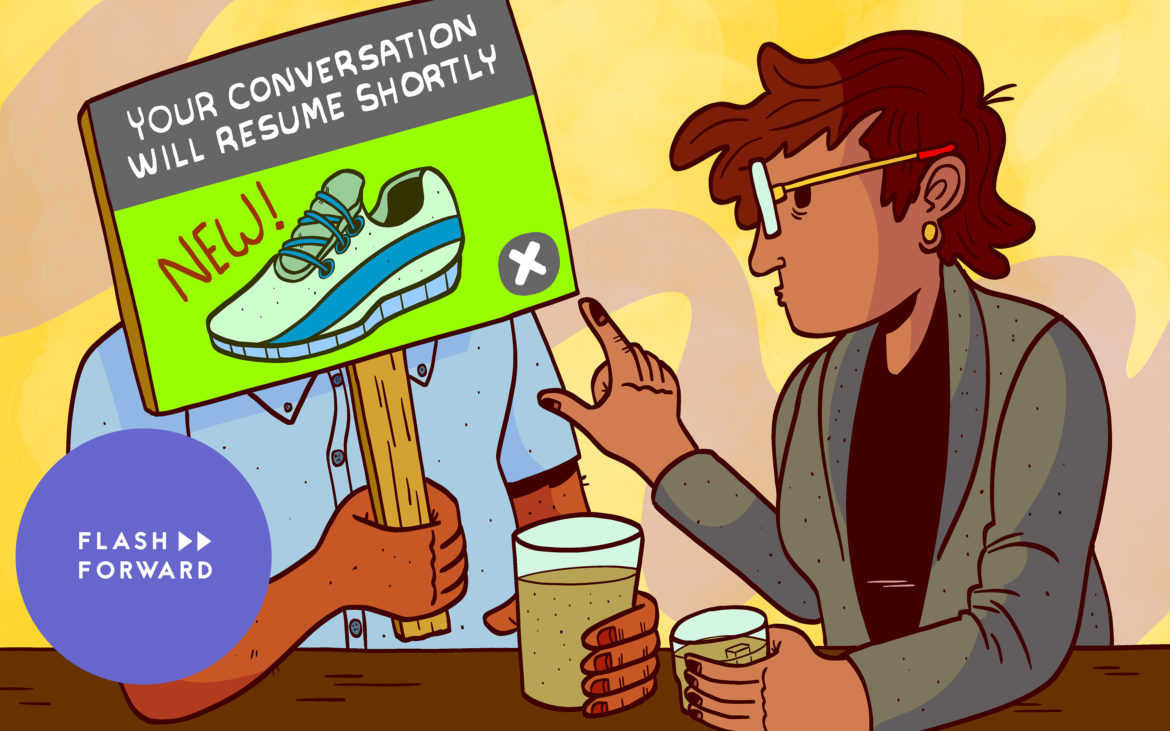
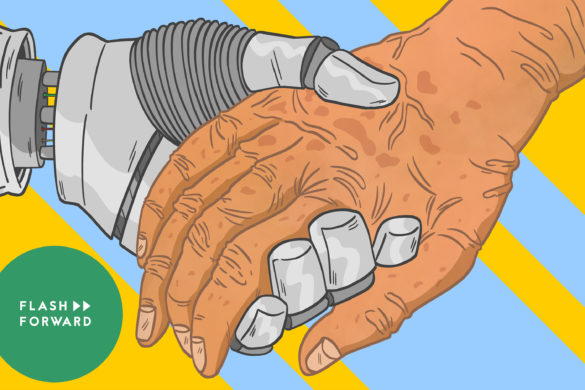

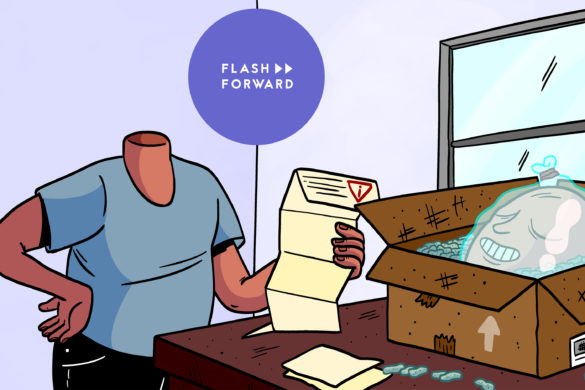
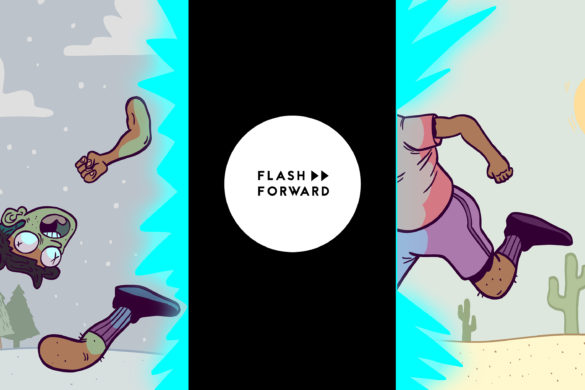
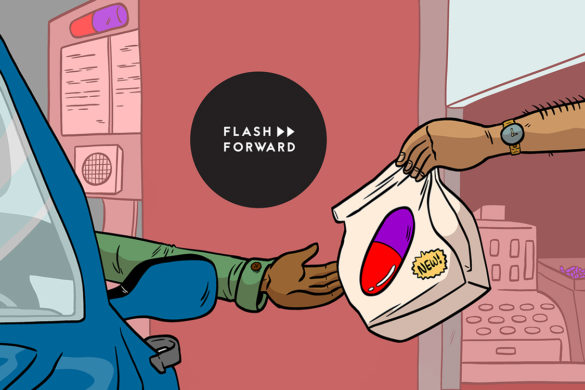
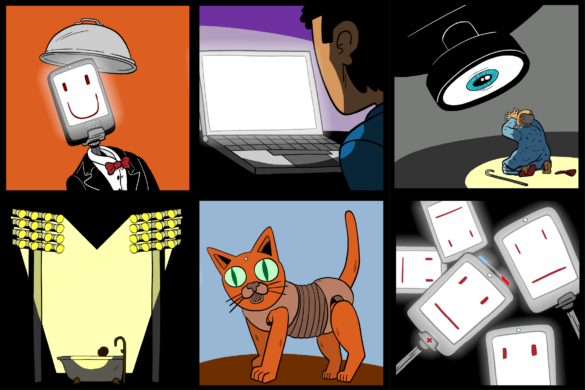
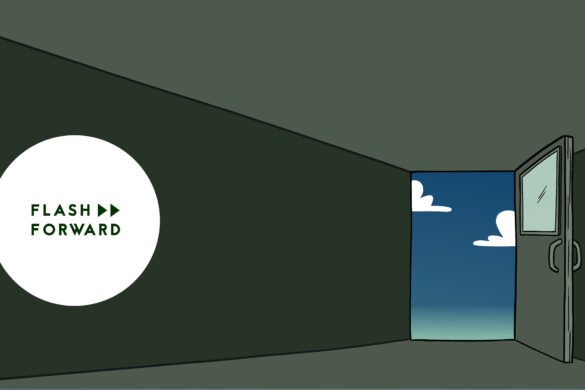
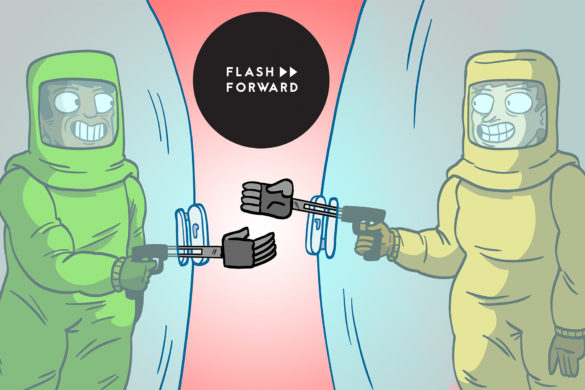

1 comment
This reminded me of the AdBuddy from the Netflix series Maniac. Here is an article that goes into some detail:
https://www.fastcompany.com/90244917/ad-buddy-friend-proxy-netflix-maniac